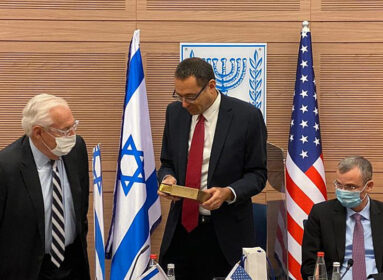
By Cindy Mindell
Known worldwide as the “King of the Storytellers,” Rabbi Hanoch Teller is a prolific author whose critically-acclaimed books – 28, at last count – have sold more than 300,000 copies and are translated into five languages, and have been praised for their captivating prose, pedagogic value, as well as their tender, profound insights into the human condition.
His latest book, Heroic Children: Untold Stories of the Unconquerable, tackles a little known aspect of the Holocaust: the voices of child survivors. Teller, who grew up in Stamford, will return to his hometown to discuss the book on Thursday, Feb. 11.
Born in Vienna, Austria in 1956, Teller moved with his family to Stamford when he was two. He left to attend the New England Academy of Torah in Providence, R.I. While there, he was the only high-school student in New England selected to serve on the Rhode Island Board of Governors for Higher Education. He graduated from Yeshiva University with high honors at age 19 and made aliyah.
In addition to teaching in several Jerusalem post-high school institutions, Teller is also a filmmaker who has produced two award-winning documentaries that have been televised and screened in many countries. Dubbed by Dr. Mehmet Oz as “the greatest, and certainly the most entertaining, storyteller,” Teller is a globe-trotting orator who has lectured before audiences on five continents, in 24 countries, and in 40 U.S. states.
For Teller, Heroic Children represents what he calls “the final frontier” of Holocaust education.
“When the war was over, people, understandably, were very anxious and eager to relate their stories and how they had suffered,” he says. “Children couldn’t tell their stories then, and basically, they have not been told – certainly not in their own voices, because so few children survived. These children survivors are now in the grips of very old age, if they’re still alive. So I felt compelled to go out and seek these voices wherever they may be.
My subjects come from every corner of the Holocaust ‘kingdom’ — different socio-economic groups, religious and not religious, male and female. My subjects are in Johannesburg, South Africa; Mexico City; Chicago; Brooklyn; Zurich – I went all over the world to find these people.”
Each of the nine stories begins wherever the survivor was when the war broke out and ends upon liberation. After each account, Teller includes an epilogue describing what happened to the subjects and their families after the war.
“That’s really the victory story: how they become such significant members of society and of their communities,” he says. “For example, one of them is a world-famous doctor and a very generous and philanthropic person, and his grandfather was the wealthiest person in all of Munkacs [in the Transcarpathian region of Ukraine].
Growing up, he would sit at his grandfather’s feet and hear what it was like to have money and use it properly.”
Teller found some of the stories to be heartening. A group of Jewish children running away from pursuers in Vichy, France, came across a statue of the Three Musketeers and stopped to play-spar with one another. One of the survivors tells of her family being saved by illiterate, devout Catholics in Italy who welcomed the Jewish strangers into their home.
“What’s uplifting about the stories is that they create what I call the ‘Holocaust mentality,’” Teller says. “As a reader, you feel somewhat moronic and imbecilic to belly-ache and engage in too much self-pity. Just as we had people who hit the absolute nadir of depravity during the Holocaust, some people, when they were tested, really shone.”
For any Jew to survive the Holocaust required a miracle; for a child to survive meant “a miracle on steroids,” Teller says.
“Children wrenched away from their parents had it very hard to manage on their own; in the squalor, it was so hard to manage, and once they fell under Nazi dominion, children were not good at following instructions and they were not necessarily productive as slave-laborers,” he says. “They were usually thrown alive into the flames – that was the plight of children. Over 1.5 million children were murdered and less than three percent survived. So a child has a lot of odds stacked against him.”
And yet, one of Teller’s interviewees survived a slave labor camp together with a group of boys, all younger than 15, who vowed to stay alive. “They made a pact that, no matter what, they were not going to succumb,” Teller says. “One of the rules they made was that you could not cry in public – you had to do it when no one was looking.
In the winter, when there was the problem of hypothermia, they would take gravel and rub it on each other’s backs to stimulate blood flow – whatever they could think of to keep their spirit intact. They made such a strong bond that the Nazis couldn’t break them.”
Teller says that he hopes his book brings the reader renewed perspective on how to face adversity. In his introduction, he describes the common elements among child survivors, from early nurturing to bonds of family and friends to the selfless actions of a righteous few. “We must view everyday challenges (and even the more serious setbacks) of our own lives with a healthy dose of perspective, a jolt of humility, and a profound sense of gratitude,” he writes.
Teller summarizes this sentiment in the preface of his book.
“While Heroic Children is a story of horror, it is also a story of hope. It is about the life and times of those heroic children … and it is also about you and me. About each of us, trying to make our way in an increasingly complex world. Few of us will ever face struggles as monumental as what these nine youngsters endured under the reign of Hitler. But this doesn’t change the fact that today (or tomorrow) you may find yourself overwhelmed by serious challenges, devastating setbacks, or periods of profound despair. It is my hope that the experiences of these children will serve as inspiration; for if they, of such tender years, were able to heal and flourish in the wake of unimaginable adversity, then surely you will be able to confront head-on whatever obstacles may appear, and summon the strength to triumph.”
Heroic Children: Untold Stories of the Unconquerable with author Rabbi Hanoch Teller: Thursday, Feb. 11, 7:30 PM, Congregation Agudath Sholom, 301 Strawberry Hill Ave., Stamford.
For information: cas-stamford.org (203) 358-2200.








 Southern New England Jewish Ledger
Southern New England Jewish Ledger










